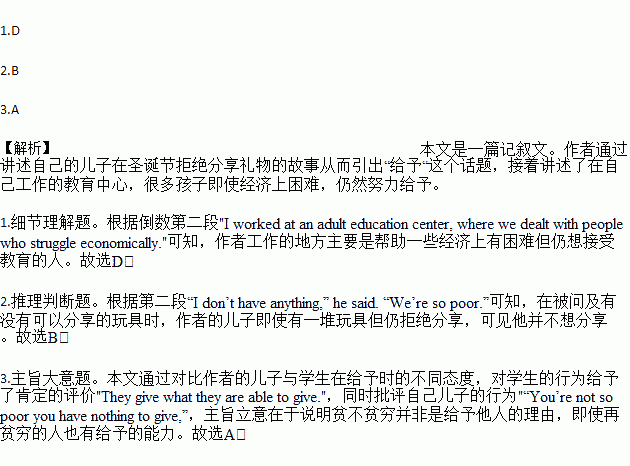题目内容
“Don’t you have any toys you want to share?” I asked my son during our church’s Christmas toy drive. “What about all those things in your closet you haven’t used in years?”
"I don’t have anything,” he said. “We’re so poor.”
We’re only “poor” because we refuse to buy him the phone he wants for Christmas, which would also require a monthly texting charge.
“You’re not so poor you have nothing to give,” I found myself saying to him, a phrase my mother often used on me.
At work the next day, one of my students said, “I didn’t spell your name right,” as she handed me a Christmas gift—a box of chocolates. No wonder she hadn’t spelled it right—I had only worked at the center for a couple of months, and my name is not easy to pronounce, even in English, which is this woman’s second language.
I hadn’t expected a gift—I worked at an adult education center, where we dealt with people who struggle economically. When I was hired, my boss told me she tries to keep snacks around the center and cooks “stone soup” once a week, where whoever can bring something in does, because “You will hear growling bellies here. They give their food to the children before they themselves eat.”
And yet these people, so grateful for a second chance at getting an education, unable to sometimes even afford the gas money to come in, manage to do something for us nearly every week. Some bring in food; others do chores around the center. They help and encourage one another, and us. They give what they are able to give.
1.Who does the education center intend to help?
A. Local people out of work.
B. Adult students unable to spell.
C. Immigrants on empty stomachs.
D. Poor people eager for education.
2.What can we learn from the text?
A. Students learn to do chores at the center.
B. The boy was unwilling to share his toys.
C. The center offers chocolate as a Christmas gift.
D. The author has high expectations of her students.
3.What may be the best title for the text?
A. Never Too Poor to Give
B. Never Too Late to Learn
C. A Second Chance to Seize
D. An Unexpected Gift to Treasure
 天天向上一本好卷系列答案
天天向上一本好卷系列答案 小学生10分钟应用题系列答案
小学生10分钟应用题系列答案

 kitchen,leaving me totally__________to serve food with them. Soon large numbers of homeless families__________in like rushing river.A little girl,around 5 years old,walked up to me I__________her a sandwich. She took it and joined her family quickly.As she walked away, I__________she was wearing a coat.Clearly too big for her, hanging__________on her thin body, and couldn’t help thinking how much I had__________with her.It suddenly struck me that how__________I am.
kitchen,leaving me totally__________to serve food with them. Soon large numbers of homeless families__________in like rushing river.A little girl,around 5 years old,walked up to me I__________her a sandwich. She took it and joined her family quickly.As she walked away, I__________she was wearing a coat.Clearly too big for her, hanging__________on her thin body, and couldn’t help thinking how much I had__________with her.It suddenly struck me that how__________I am.